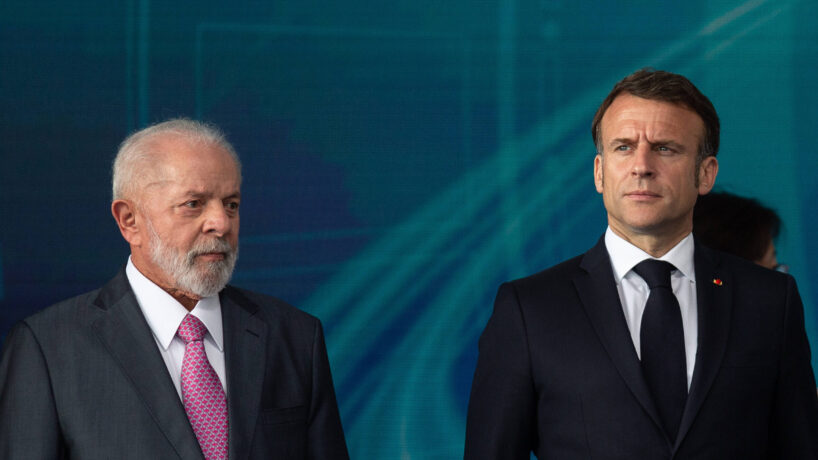Before the president's trip to Brazil, the Elysée had announced that Emmanuel Macron did not wish to raise the subject of Mercosur with President Lula. In front of an audience of Brazilian businessmen, he finally recalled his opposition to the trade agreement concluded between the EU and the Mercosur countries (Brazil, Argentina, Uruguay, Paraguay, Bolivia) in 2019. Is this a constant position of France?
This is not at all what Emmanuel Macron said a few years ago! It should be remembered that he was initially committed to signing this agreement. But the agricultural crisis accelerated France's break with the negotiation process. It is also worth noting that this is not the position of all our European partners. However, it is a trade agreement concluded directly by the European Union.
The Germans, for example, are pushing for its ratification. They consider that in the balance between what they have to lose and what they have to gain, the positive far outweighs. Their food, energy and automobile industries have a lot to gain from establishing themselves in South America, particularly to compensate for losses due to the Russian market. For Berlin, Mercosur is seen as a great opportunity in a complicated geopolitical context.
Emmanuel Macron highlights the fact that Mercosur does not sufficiently take into account “the subject of biodiversity and climate”. Is this an admissible argument?
France's reluctance to Mercosur is an old story, dating back to the end of the 1990s. Criticisms of this agreement preceded the environmental issues, which were later added to French hesitations. The crux of the matter is the protection of the French agricultural sector, in particular 'large' agriculture and its most productive sectors. French governments are always called to order by organizations like the FNSEA, which insists that the agreement risks weakening certain sectors of our agriculture. It is true that agricultural products arriving from Mercosur cost less to produce, and that they will therefore be more interesting for the French consumer. This competitiveness gap is likely to weaken our farmers, which is why some are calling for the European market to be protected against the South American market. But at the same time, Mercosur responds to the interests of other French economic sectors, such as the industrial sector.
Precisely, what is the standoff between France and the Mercosur countries about?
Historically, the battle concerns import quotas. Within the framework of Mercosur, we negotiate agricultural volumes which we authorize or not to enter the European market. Everything is very well defined, the negotiation is done product by product. But it must be remembered that this agreement does not only concern agriculture. There are also negotiations on the products that Europeans can export to South America. These are processed products with very high added value. It is on this point that the Mercosur agreement is criticized in South America, because some believe that it is an asymmetrical agreement.
President Lula is in favor of Mercosur. What are the criticisms leveled at the treaty in South America?
This may indeed seem very surprising, but South Americans, led by Lula, are very favorable to free trade. They consider that this freedom of trade can lead them to gain market share on a global scale. Lula campaigns for Mercosur, because he wants to advance the interests of his agri-food industry. Which does not prevent the existence of criticism around the treaty.
The Europeans are regularly accused of offering an asymmetrical deal, by authorizing the export of low value added products from agriculture in exchange for high value added products from European industries. Now, the environmental issue has entered the debate and the EU is accused of showing hypocrisy. The subject of “environmental standards”, which was put forward by Emmanuel Macron, is seen as a way of practicing protectionism which does not say its name. For the Mercosur countries, the climate issue now raised by the Europeans is seen as a means of further limiting exports to the European continent.
Emmanuel Macron calls for building “a new agreement” with the Mercosur countries, what could it look like?
This is a formula which aims to drive home the point of the blockage and reaffirm the disagreement with Brazil. In the past, Lula has also made less than tender statements regarding Emmanuel Macron's positions. Generally speaking, Mercosur is a pebble in the shoe of Franco-Brazilian relations, and it is impossible to know today what a new agreement could look like. Does Emmanuel Macron know this himself?
For the Head of State, it was above all a question of reassuring the French agricultural sector, by reminding that the treaty will not be ratified. However, if France does not ratify it, it will not be able to apply. It is an agreement that must be signed and ratified by all EU member states as well as by the four Mercosur countries, which have not yet ratified it either. As it stands, there is therefore no chance of it coming into force.
Emmanuel Macron's state visit to Brazil ends this Thursday, can we say that the results are positive?
Historically, the France-Brazil relationship is very strong, in many aspects. The two countries have maintained relations for 200 years, and apart from the Bolsonaro period, things are going very well, particularly from an economic point of view. It is one of the markets towards which the most French investments are directed in the world. Emmanuel Macron's visit aimed to remind us that despite the differences accumulating between France and Brazil, the relationship is firm and powerful. The two presidents took the stage to show that Paris and Brasilia shared a common destiny. On this point in any case, the results of the visit are rather positive.

